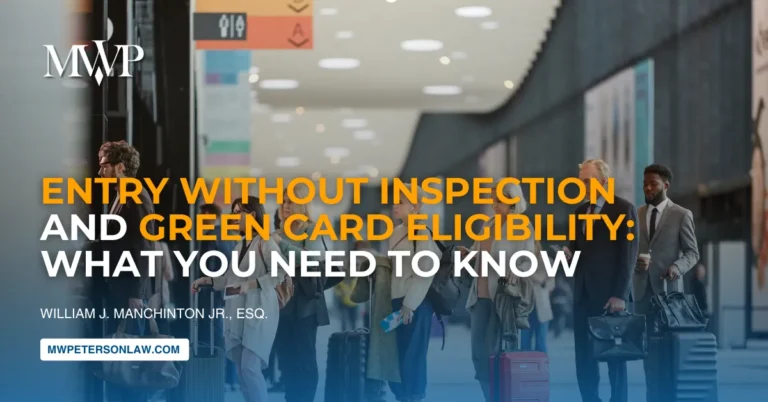Eligibility for Adjustment of Status
Debunking the usual question for what is the adjustment of status green card process. At the Law Office of Matthew Peterson, we are here to help and answer everything that tackles legal things. If you are an immediate relative of a US citizen and did not cross into the US illegally, you could be eligible for adjustment of status. This means you do not have to travel outside of the United States to get your green card but can remain in the country while your application is pending.
Immediate Relative Definition
To begin with, you must be an immediate relative of a US citizen. This means you’re a spouse, parent (if the child is over 21), or child (if you’re under 21 and unmarried) of someone who was born in the United States or was naturalized to become a US citizen.
Legal Entry Requirement
Second, you must have come to the US legally. This means you came in through customs and were inspected.
What forms do I need to file for Adjustment of Status?
The primary forms required for AOS include:
- Form I-485: Application to Register Permanent Residence or Adjust Status
- Form I-130: Petition for Alien Relative (if applicable)
- Form I-765: Application for Employment Authorization (if you wish to work while your application is pending)
- Form I-134: Affidavit of Support (if you need financial sponsorship)
Application Process for Adjustment of Status
If these categories apply to you, you could be eligible for adjustment of status and apply for a green card. This means you would submit an I-485 along with your sponsor’s (citizen family member’s) I-130. Your sponsor will also have to prove that they can support you, or you can get a substitute sponsor.
Employment Authorization
You may also be able to work while your green card application is pending by applying for an employment authorization document.
Fiancée Visa Option
If you are planning on marrying a US citizen, you can receive a fiancée visa to allow you to travel to the United States to marry, and then apply for adjustment of status afterward.
What Do I Need to File for Adjustment of Status?
This process is complicated and is full of pitfalls. It can involve a lot of documentation, especially if you recently married a US citizen. It’s better to hire an experienced Boston immigration lawyer to help rather than trying on your own. Otherwise, you risk delays, additional expenses, and your petition being denied.
Required Documentation
You generally need proof of your sponsor’s citizenship and copies of identification documents such as your passport, birth certificate, and other important documents. If these are in a foreign language, you need to get an official translation. There are a host of other financial and official documents you will need.
Streamlining the Process
If you want to apply for adjustment of status, an immigration attorney can streamline the process. We gather almost all of the information and documents electronically with easy-to-manage forms and checklists.
Contact Information
Contact the Law Office of Matthew Peterson today if you need an immigration attorney to help with your green card application or adjustment of status. Our office is located in Boston, Massachusetts, but we practice immigration law all over Massachusetts. Call us today at (617) 295-7500 if you need an immigration attorney in Massachusetts.
Frequently Asked Questions (FAQs)
1. How long does the adjustment of status process take?
The adjustment of status process can vary significantly depending on individual circumstances, the volume of applications at the processing center, and any potential complications with your case. Typically, it can take anywhere from several months to over a year. It’s advisable to check the current processing times on the U.S. Citizenship and Immigration Services (USCIS) website for the most accurate information.
2. Can I travel outside the U.S. while my adjustment of status application is pending?
Traveling outside the U.S. while your adjustment of status application is pending can be risky. If you leave the country without obtaining advance parole, your application may be considered abandoned. It’s important to consult with an immigration attorney before making any travel plans during this time.
3. What happens if my adjustment of status application is denied?
If your application for adjustment of status is denied, you will receive a notice explaining the reasons for the denial. You may have options to appeal the decision or reapply, depending on the circumstances of your case. Consulting with an immigration attorney can help you understand your options and the best course of action.
4. Do I need to attend an interview as part of the adjustment of status process?
Most applicants for adjustment of status will be required to attend an interview with a USCIS officer. During this interview, you will be asked questions about your application and background. It’s important to prepare thoroughly for this interview, and having an immigration attorney present can be beneficial.
5. What are common reasons for denial of an adjustment of status application?
Common reasons for denial include failure to meet eligibility requirements, lack of sufficient supporting documentation, issues related to criminal history, or discrepancies in information provided during the application process. Ensuring that all documentation is complete and accurate can help reduce the risk of denial.











